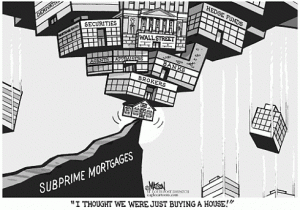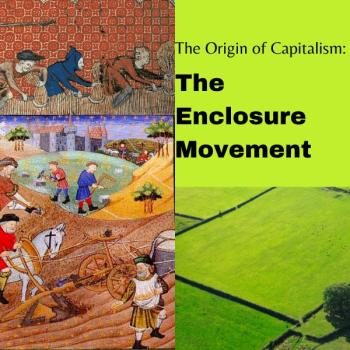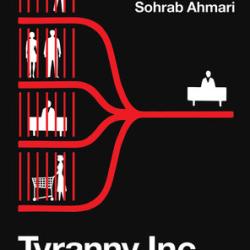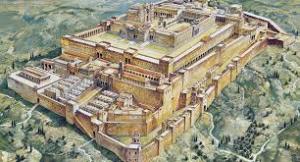 Banking is spiritual? That’s the idea here, also that the kind of spirituality matters. William T. Cavanaugh describes the spirituality of Wall Street as a flight away from material reality. My dad’s banking practice moved in the opposite direction, and that’s spirituality too. The first kind gave us the recession of 2008. The second is Christian. I’ll get to Dad later. Cavanaugh is going to help me with Wall Street.
Banking is spiritual? That’s the idea here, also that the kind of spirituality matters. William T. Cavanaugh describes the spirituality of Wall Street as a flight away from material reality. My dad’s banking practice moved in the opposite direction, and that’s spirituality too. The first kind gave us the recession of 2008. The second is Christian. I’ll get to Dad later. Cavanaugh is going to help me with Wall Street.
A theologian based in DePaul University, Cavanaugh is interested in political theology and economic ethics. He has a number of books on economy and politics, which he analyzes from a Christian point of view. He has some lectures on economy published on YouTube. One in particular made me think about my dad. Also, there’s a book called God the Economist by M. Douglas Meeks, which deserves a post of its own but does enter into my thoughts here as well.
Cavanaugh’s youtube talk is called “The Myth of Prosperity.” In it he tells how banking practices led to the recession from which we have been recovering. He cautions us against blaming the crisis solely on greed. No doubt, there was greed involved but focusing on personal greed too easily lets the rest of us, and our economic system, off the hook. (Of course, we’re not greedy.) Cavanaugh digs quite a bit deeper. He says the global economy has been involved in a “flight from reality.” The crisis has been driven, he says, by a “desire to transcend the material world,” to get free of the things which essentially go along with matter, namely: limit, death, scarcity, risk, and dependence. Parts of that sound almost religious.
Well, Cavanaugh says, something religious was going on in the banking industry. The Meeks book, explains that, even though our economic system has pushed God to the sidelines or denied God outright, still god concepts of a particular type—not the Christian type—rule in the secular world. This is a god that wants to have as little connection as possible with material reality.
The disconnect from reality comes in a number of steps, all of which led to the most recent global financial meltdown:
- Banks lent money for the “American dream” of owning a home to people who couldn’t pay the money back. Very low interest rates made such a practice attractive, but it was mainly aided by the fantasy that homes would pay for themselves by rising in value. The problem was that the rise was fueled by the loans themselves–first step away from reality.
- Banks, knowing that at least some of the loans were risky, passed the risk on by packaging them for sale. Given AAA bond rating, high risks were sold as safe investments. Step two into unreality.
- These packages, i.e., debts, were listed as assets and used as collateral for borrowing more money. Step three.
- Then came credit default swaps, basically a way of gambling. A lender buys an insurance policy on a loan that might default. The insurer, of course, gambles that it won’t. If you’re John Paulson around 2007, you buy up as many of the insurance policies as you can because you believe the whole housing market is going to collapse, and you make $4 billion worth of insurance claims in what’s been called the greatest trade ever made. Not so great for the rest of the economy, though.
It was an economy detaching itself by steps from reality, built more and more on debt, that is, nothing. Its aspiration is not simply to make money but, in Cavanaugh’s words, “to leave behind physical constraints and limits that are created by being a mortal creature in space and time; it’s an attempt to transcend that, to cheat death…to get beyond our damnable servitude to material reality.”
Cavanaugh explains how this economy tries to avoid three essential characteristics of life in material reality: scarcity, risk, and the need for trust. I think he would agree to add location in time and space.
Scarcity is fundamentally a matter of unlimited desires facing limited resources. The obvious answer to that is the longstanding Christian (or Buddhist if you like) ideal of purposefully limiting desire; but our current economic “religion” preaches exactly the opposite of that. Instead, this economy tries to get around scarcity by financialization, that is, making wealth without any increase in material production.
Risk, of course, is a factor in any loan. Securitization dealt with that, supposedly, by deferring risk, passing it on or insuring it. It’s living on value borrowed from the future.
“Trust” is one of a number of words that could have come straight out of the Bible or a religion textbook. Funny how that word actually names a group of financial instruments, but, in today’s world of high finance, it’s an oxymoron. Money is made more quickly if the need for trust, in the Biblical sense, is done away with. Profit can be made on distrust itself. In the credit default swap game you can even root for another’s failure. The basic aspiration here is freedom from obligation to others or from relying on others.
Finally, locality becomes irrelevant in high finance. No one needs to know in what part of the world a loan originates or who owns the loan now. We transcended that too.
Spirituality of banking according to Dad. My dad’s banking practice was very different. As a loan officer in a small-town bank, he would spend hours reviewing the borrower’s finances. He would examine the purpose of the loan and its prospects for success if it was for, say, a business venture. Both borrower and lender were taking a risk and both knew and accepted it. Trust was important. You needed to know your neighbors. There was no flight from material reality in my dad’s banking practice. But that practice was merely quaint in the later world of high finance.
There is a split between two spiritualities. One tries to leave material reality behind so it appears a lot more spiritual than the other. My dad’s practice was well grounded in material reality, with a real place and time, real people who are neighbors to each other, a real project that might succeed or not–so real risk. It doesn’t sound very spiritual, but there are spiritual things involved. Only this spirituality is not a flight away from material reality but rather a move further in.
My dad’s kind of spirituality involved a thing that we call “credit.” Credit is another name for belief (from “credo” in Latin). It’s the lender’s belief that the borrower is credit-worthy, that he or she is able and willing to pay back the loan. Then there’s what we call “debt,” basically the borrower’s obligation to pay back the loan. Neither of these two spiritual realities takes one out of the material world at all; in fact, they’re just what’s there in the real-life situation of lender and borrower. It’s nothing like the fancy financial instruments of Wall Street.
That’s a Christian kind of spirituality, one that engages the world that God created and called good. These spiritual realities live in real flesh and blood; They are incarnational, like Jesus.
For Christians this world is not something to escape from, to be saved from. It’s something to save and, on the way, to rejoice in. Some myths depict creation as a fall away from God, but in the Christian story creation is a continuous, intimate, sustaining relationship between creator and created. Some sort of “fall,” some rebellion within that relationship, is real enough. So material reality also is something that needs repairing, reconnecting. That’s what Christian spirituality is about, too.
This Wikipedia article goes into more detail on the causes of the Recession of 2008.
Image credit: Modkraft












